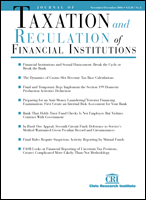Complete Issue
Author: Houman Shadab.
Source: Volume 27, Number 01, September/October 2013 , pp.1-58(58)

< previous article |return to table of contents
Abstract:
With credit markets in a state of flux, our first article, by Randy Clark, addresses the tax consequences of re-pricing debt instruments for investors. Mr. Clark focuses his analysis on the re-pricing of collateralized loan obligations, and the tax consequences of “deemed exchange” rules in particular. Collateralized loan obligations are often issued by offshore securitization vehicles. In this issue’s second article, Robert Chase, David Roby, and Jonathan Goldman discuss the broader issue of how comprehensive tax reform may impact the tax treatment of offshore investment funds. The authors discuss the current tax treatment of offshore vehicles and the potential impact—and negative consequences—of the proposed “managed and controlled” legislation introduced by the International Tax Competitiveness Act of 2013. In this issue’s third article, Parker V. Sherry, Christine M. Debevec, and Andrew K. Stutzman examine how spousal guarantees are subjecting commercial and consumer lenders to increasing regulatory scrutiny and litigation. In particular, the authors discuss how spousal guarantees may run afoul of the Equal Credit Opportunity Act (ECOA), and what lenders can do to minimize the risk of violating ECOA and ensure compliance with its implementing regulations. Securitization is the subject of our fourth article, by Josh Sterling, Charles Sweet, and William R.B. Springer. The authors examine the potential for securitization vehicles that trade swaps to fall under the regulatory orbit of the Commodity Futures Trading Commission (CFTC). The authors discuss the nature of regulating such vehicles as commodity pools and the exemptions that permit relief from such regulation provided by recent CFTC interpretative guidance. Sandy Bhogal and Ben Fryer, in our fifth article, discuss another potentially looming legislative change; namely, a tax on financial transactions. The authors cover the European Union’s proposed Financial Transactional Tax (FTT), due to take effect next year in numerous significant European jurisdictions. The FTT is important to understand for U.S. financial-institution taxpayers—not only because of its extraterritorial impact, but also because of the ubiquity of cross-border transactions and the potential for the FTT to influence U.S. lawmakers. This issue concludes with a brief discussion of how the Marketplace Fairness Act of 2013 (S. 743) impacts banks. Harley Duncan, Marianne Evans, and Dennis Prestia discuss how the Act—which would permit states to tax sellers without a physical presence—could lead to banks that provide certain financial services for the first time registering and collecting taxes in some states.Keywords: Debt re-pricings; U.S. Tax-Exempt Entities; foreign investment funds; Equal Credit Opportunity Act; Regulation B;commodity pool operator registration; Financial transaction tax;S. 743; sales taxes;
Affiliations:
1: New York Law School.